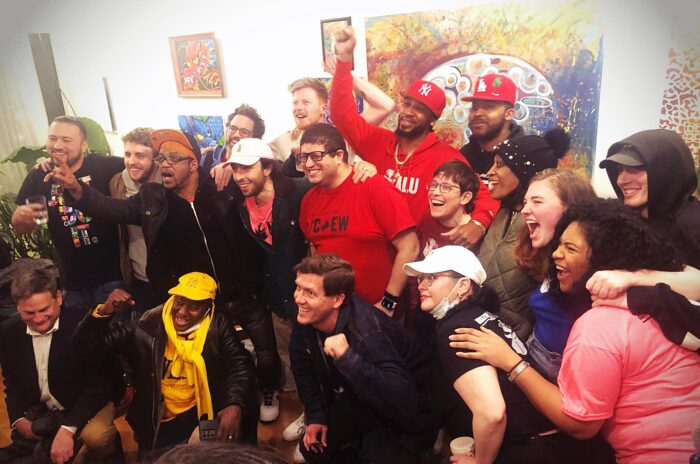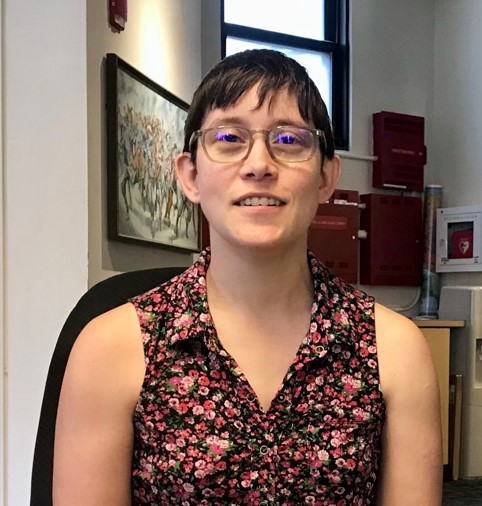»Unions must be led by the workers«
Justine Medina explains how the Amazon Labor Union managed to win in Staten Island
Interview: Lukas Hermsmeier

The date April 1, 2022 will go down in the history of the workers’ movement. In Staten Island, New York, the majority of workers at a large Amazon warehouse voted in favor of a union. In the United States where the company, founded in 1994, has over one million employees, there has – up until this point – not been a single Amazon location with union representation. A few days after the successful election, we spoke with Justine Medina, one of the key organizers in Staten Island.
It’s rare that a union gets as much attention as yours does right now. Jacobin called it »the most important labor victory in the United States since the 1930s«. You’ve been on the front page of the New York Daily News, one of the largest newspapers in the country. How do you feel?
Justine Medina: Yesterday, I went to one of the Starbucks branches here in the city that is unionizing to show solidarity and people started recognizing my face – that’s pretty weird, surreal. I’m mainly proud of all the worker-organizers who made this victory happen, and I feel incredibly honored to be a part of something that is really changing the world.
How is this victory changing the world?
I think that the success of this project has completely flipped the current orthodoxy on its head. It became clear that unions have to be led by the workers themselves, not by people on the outside. We are seeing a radical grassroots movement. And then there’s something about Amazon’s sheer size and the role it plays that makes this success so remarkable, simply because Amazon runs so much of the global supply chain.
Amazon workers have tried to unionize before and failed. What was different about this campaign?
The founders of the Amazon Labor Union (ALU), Chris Smalls and Derrick Palmer, studied previous efforts and learned their lessons: Union campaigns are successful when they are built and led by the workers, by people who know Amazon through their own work experience. It’s truly hard to understand the specific conditions for an outsider. It was the same for me, even though I had read about the exploitation and repression inside Amazon. It’s just so different to then live it.

Justine Medina
is 32 years old and an Amazon worker at the JFK8 warehouse in Staten Island. She is a member of the Communist Party and started to work at Amazon to help organize her fellow workers.
The union campaign took its course in Spring of 2020, with the beginning of the pandemic, when one of the workers, Chris Smalls, protested for better safety conditions and got fired. One year later, in April 2021, he and others founded the ALU. You joined the JFK8 warehouse last September, with the explicit goal to organize the workforce. What led to that decision?
In the summer of 2021, one of the Amazon worker-organizers reached out to the Communist Party, because she was looking for support. I didn’t have a full-time job at the time, but I had experience as an organizer. And because I was aware of the importance of salting, I applied for the job.
Salting means that people apply for a job in a company in order to help build a union there. Do you see this strategy becoming more important in the US?
Yes, I think so, people see it as an important aspect and more people are actually doing it. About half of the organizers in Staten Island did purposely seek out their jobs in order to support Chris and the other workers. But I think it’s very important to emphasize that if you’re going to salt that you are supporting the workers and following their lead, and that you’re making a long-term commitment. I mean, everyone has an ego that they have to combat, but it’s especially true in the context of salting.
They were several crucial sites for your union, one was the break room inside the warehouse, another the bus stop outside. How did you approach the workers?
The most important thing is to talk to people in the first place. And then, of course, you have to meet them where they are. For example, one of our brilliant organizers, Brima Sylla, put a lot of work into organizing the different immigrant groups, which has resulted in numerous WhatsApp chats. But the beautiful thing about our union is that it’s incredibly diverse: race, gender, even ideologically. One of our organizers voted for Trump, his name is Pat, a middle-aged man, Italian, who likes watching Fox News, old school, you know what I mean? He flipped between 300 and 400 workers to vote for the union, his effort was decisive.
So, having a Trump supporter in the union wasn’t an obstacle and more a strength?
We didn’t ignore the different politics, nor did we avoid talking about what’s on our mind. We get along because we’re all fighting for the workers, that’s our goal. Just not everyone does this as a leftist.
I listened to »Kapital« as an audio book during my shifts. I mean, is there a better way to consume Marx in 2022 than in an Amazon warehouse?
You told Labor Notes that engaging with labor history intellectually was important. How did that look?
There was no reading circle, everybody did it on their own, then we exchanged information and recommended stuff to each other. A lot of people read Jane McAlevey, for example, or economist Richard Wolff, or William Z. Foster. I personally listened to »Kapital« as an audio book during my shifts. I mean, is there a better way to consume Marx in 2022 than in an Amazon warehouse?
It was crucial, it seems, to also communicate the joy of organizing. On TikTok you posted videos, you offered lunch for the workers, hosted barbecues outside.
Good unions are social organizations. People do things together, get to know each other. Because of the working conditions, the high turnover, and the remote locations of the warehouses, it’s especially difficult at Amazon to create something like socialization. Amazon doesn’t want there to be any connection between workers. The environment is completely alienating. We had to counteract all of that. And just for our own ability to continue to work, fun was important.
Amazon is known for union busting, the company spends millions of dollars every year on that. But you used some of their methods for yourself, please explain.
After the union was founded, Amazon started having these captive meetings to tell the workers that a union would be to their disadvantage. We would disrupt those meetings to correct false claims and tell the truth. Amazon tried to kick us out, but more and more workers realized something was up here. They suspected that Amazon was hiding something. We handed out flyers, had countless conversations and, whenever Amazon did something illegal, filed a lawsuit – which almost never happens otherwise. Amazon has a propaganda machine that we turned on its head.
Were you surprised by the scale of Amazon’s repressions?
No, we were never deterred, because we expected that, because we knew that that was coming. When they arrested Chris and the others in February, they were right back at the warehouse the next day. And the repressive condition of working there were what inspired the union to begin with.
You just stressed how crucial it is that unions are led by the workers themselves, not by outsider bureaucrats. Does that mean that established unions are getting less and less important?
I don’t think that founding a new union is the best thing to do in every case. But the established unions truly need to change. Once upon a time it was normal that unions were led by the workers and that was when unions were at their best. It needs to go back to that.
There should be more cooperation between the unions, too, right?
Yes, it’s about extensive solidarity. We were following and supporting the strike waves that were going on last year. We are following the Starbucks workers who are unionizing. Solidarity with grassroots movements and other organizations is important, too.
How did that look like in your case?
From the beginning, we were trying to build up community support, got in touch with other organizations such as the Communist Party or [the hospitality workers’ union] Unite Here whose offices we could use for phone banking. A number of student and teacher organizations helped out, there were students, teachers and professors from the College of Staten Island. The media, however, ignored the ALU for a long time.
Some organizers have critized the lack of support from left-wing politicians such as congress member Alexandria Ocasio-Cortez. You worked for her for several years. What’s your take on this?
It was disappointing every time we would invite a public figure to be involved and nothing came out of it – in AOC’s case, too. What’s important is that she getting involved now. That’s what matters. Bernie’s team is going to help us with fundraising, too.
The long-term vision is a company lead by workers.
Amazon is not going to take this defeat easily. What are you preparing for in the coming months?
Yes, they have already said that they don’t want to certify the union. We sent a demand to Amazon through our lawyers that they come to the table and negotiate. Besides this, we’re just moving forward, building the union. We’re having elections for stewards. We’re having elections for the bargaining committee. We’re going to prepare to protest and also do shopfloor actions. More union elections are coming up.
2.654 workers voted to unionize, but 2.131 voted no. How do you deal with them?
We want to bring them in, answering their questions, talking to them about their concerns. And then also a lot of people didn’t vote. We want to make sure to bring those people in, too.
One reason, workers voted against the union or abstained from voting, was the fear that Amazon would rather shutter the whole facility than allowing a union that sets a precedent. Is that a real risk you think?
No, JFK8 is one of the biggest fulfillment centers in the country and too important to the production line. I do understand the fear of the people, but this is not going to happen.
The union’s agenda includes demands like a 30 Dollar minimum wage, more vacation days, paid breaks, better support for childcare. Beyond that, what is the bigger vision?
All Amazon workers everywhere should have a union, this is why international collaboration is so important. Right now, Amazon is just completely undemocratic. A few uber-wealthy people controlling the logistics of everyone’s lives around the whole world, like modern day kings. The long-term vision is a company lead by workers. It’s not just about the conditions in the warehouses, but also about the political role Amazon plays, the military contracts, the entire internet infrastructure.
Speaking of international solidarity: Have other locations reached out to you after the victory?
From across the world! Europe, Asia, Latin America. In the US alone we’re in contact with organizers from more than 20 states right now. It’s a challenge to reach out all of them while also still building our own internal infrastructure very rapidly. In Staten Island, there is a dozen of key organizers. We’re already planning trainings to help organizers get started.